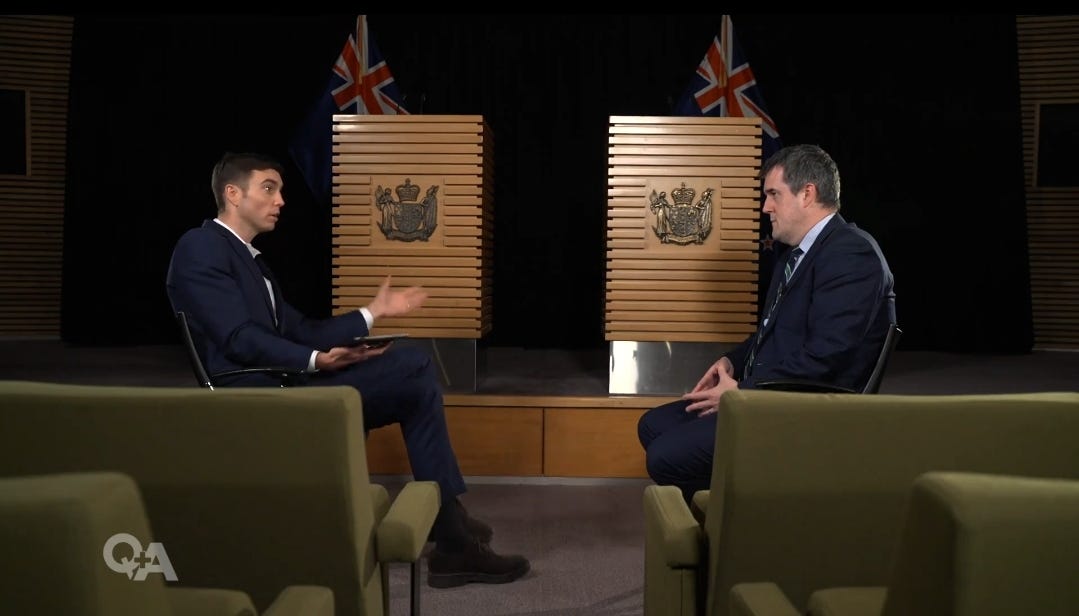Denying unwell people Emergency Housing will only increase social harm. We need to redesign the system! / A.J. Hendry
When someone is at risk of homelessness, we can argue who's to blame, or we can help them. The choice we make speaks volumes about who we are, and what we value.
One point of kōrero on Q&A this morning that I don't think got enough examination was in regard to the Government wanting to strengthen restrictions on Emergency Housing for those who have "contributed to their own experience of homelessness".
Jack Tame rightly pointed out that this policy will likely contribute to more sustained experiences of homelessness, and the Minister Chris Bishop is not wrong in pointing out that there are people that do cause damage to motel property.
What we failed to discuss was the context, such as, who are these people, and why does such damage occur? It is important to understand that the people who will be caught out by this policy will be some of our most vulnerable in society.
These will be people who are mentally unwell, have experienced extreme trauma, and also those who have been victims of domestic violence. The motel environment is not a healthy one for anyone, let alone someone under immense stress, who is mentally unwell and traumatised. As a result, violence does occur, property is damaged, and pressure on people increases.
I'm not saying any of this to excuse violence or damage to property, but it is important we understand, that when you place severely unwell and traumatised people in poor, inhumane conditions, within environments that ratchet up stress and increase anxiety, it should not surprise us that they may struggle to cope in that environment.
The truth is that emergency accommodation is not an appropriate environment for people to live in, let alone those who are experiencing mental distress, trauma and ongoing mental illness.
We should have services and housing for people at risk of homelessness that are trauma informed, equipped with mental health services and support, and provide a therapeutic environment for people. We don't. And that is something that deserves more questions, attention and scrutiny.
We know what the result of this policy will be, because it is already happening. To be fair to the Government, this policy was alive and active under the last Government. The result has been that some our most vulnerable people, including some of our most traumatised young people, are placed in the too hard basket by both Government and community services.
Instead of understanding their behaviour through a trauma informed lens, the policy encourages services to view our whānau and young people as the problem who, because of their inability to cope in the unhealthy environment they have been placed in, are thus to blame for their ongoing experience of homelessness.
The result being that they are left to themselves, denied support, and at greatest risk to themselves and at times to others.
Emergency accommodation is not the answer for those who are in immediate housing need. Nor is building more houses the only solution we should be pursuing. Yes, we need to build more houses. But, right now, we still have an immediate need and there is more we can do to support people. In fact, there will always be a need in our housing continuum for those in crisis to have a safe, supported, place.
That is what we are working towards building at Kick Back through The Front Door and The Safety Net Project. Both are alternatives to emergency accomodation that take a trauma informed approach to responding to the needs of young people who need housing tonight.
The reality is, if someone is in crisis, there is no point arguing over if they are responsible for that crisis or not. The fact is, they are standing in front of you, and they need help. Our system should be designed in such a way that it is able to respond to that need in a trauma informed, caring, and compassionate manner.
The Emergency Housing System does not need tinkering. It needs a redesign.
And until we take this seriously, homelessness will continue to increase, and mentally unwell and traumatised people will continue to be funnelled onto our streets and, from there, into our prisons.
Emergency Accommodation is one of the great shames of New Zealand society. It is by far time we did something about it.
#LoveIsTheWay
A.J. Hendry is a Laidlaw College graduate, and a Youth Development Worker and rangatahi advocate, working in the Youth Housing and Homelessness space. He leads Kick Back, a service supporting rangatahi experiencing homelessness and is also an advocate working collectively to end youth homelessness in Aotearoa. He is also the curator and creator of When Lambs Are Silent.





